Greg Massialas is patriarch of America’s first family of fencing. His target: gold

Three-time Olympian Greg Massialas has coached his son Alex and daughter Sabrina into foil-fencing champions.
- Share via
Reporting from San Francisco — The plan was audacious, devised by a fencer who had fallen short of his dreams.
His sport had been relegated to the shadows in the U.S., which might have explained why Americans won only a couple of Olympic medals over the previous half-century.
Still, as Greg Massialas began coaching after-school programs in the late 1990s, he printed out a timeline and stuck it on a wall.
“Every day I’d sit there and look at it,” he said. “Basically, the bottom line was to produce Olympic champions.”
Two decades later, his small San Francisco club has contributed to a surge in American fencing, churning out athletes who can compete with Italians and Russians in the discipline of foil.
The list includes his son, Alexander, who took silver at the 2016 Summer Games, and daughter, Sabrina, a junior world champion. Massialas doubles as a national coach, overseeing a U.S. men’s team that — with Alexander and clubmate Gerek Meinhardt — ranks among the best in the world.
Sign up for our daily sports newsletter »
“Greg always had this vision,” said Race Imboden, an American who is currently No. 1 in foil. “He had the idea that one day this group of guys could be dominant … he was saying it for a long time and now he’s proven it.”
One item on the Massialas to-do list remains unchecked — his fencers have yet to stand atop the Olympic podium draped in gold.
This weekend, with the FIE Grand Prix circuit making a stop in Anaheim, they will have a final tune-up before the start of a year-long qualification process for Tokyo 2020.
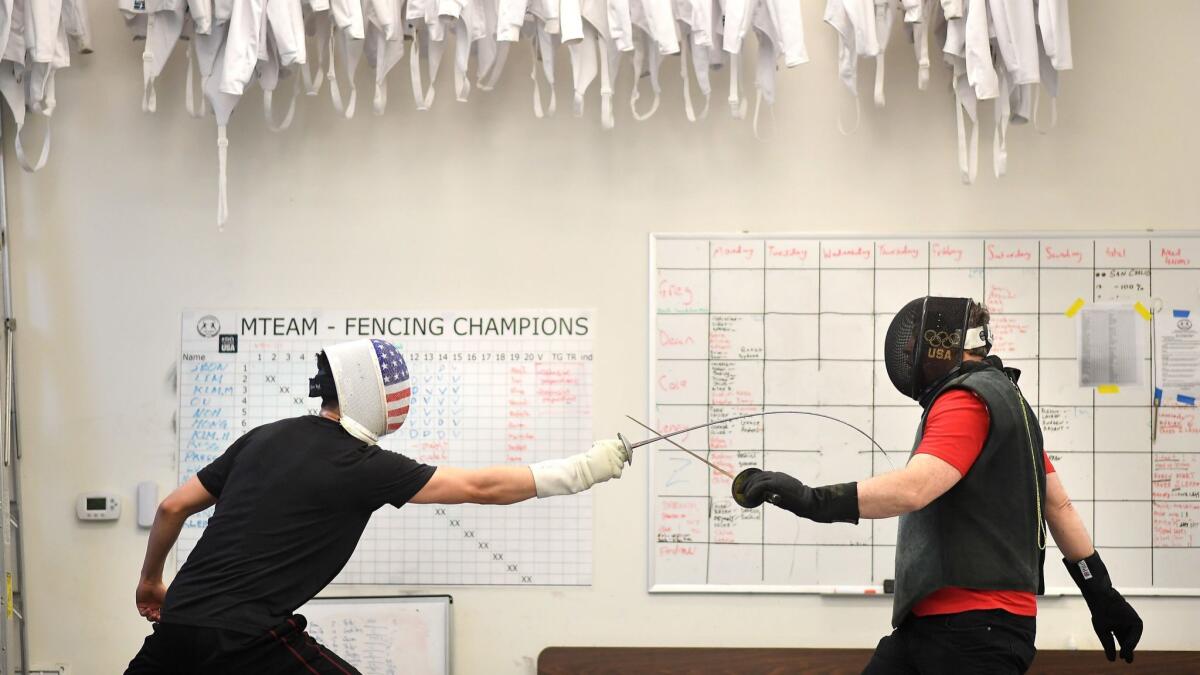
Massialas will be strip-side. The 62-year-old is built stocky, given to long dialogues about technique and, during matches, sudden outbursts as he barks commands from the coach’s box.
“I am driven toward this,” he said. “There is still some unfinished business.”
::
The tournament at the Anaheim Convention Center, which will not include fencing’s other two disciplines, epee and saber, has attracted a slew of top names.
Imboden will compete on the men’s side, as will No. 2 Alessio Foconi and reigning Olympic champion Daniele Garozzo, both of Italy. The women’s draw features No. 1 Inna Deriglazova of Russia, No. 3 Lee Kiefer of the U.S. and No. 7 Ysaora Thibus of France.
Meinhardt arrives at No. 8 and Alexander, who started the season slowly but took bronze in Cairo two weeks ago, is No. 13.
“At this point, you’re kind of rising to the occasion,” Alexander said. “It’s the start of the Olympic run.”
A routine the elder Massialas knows well, as a coach and athlete.
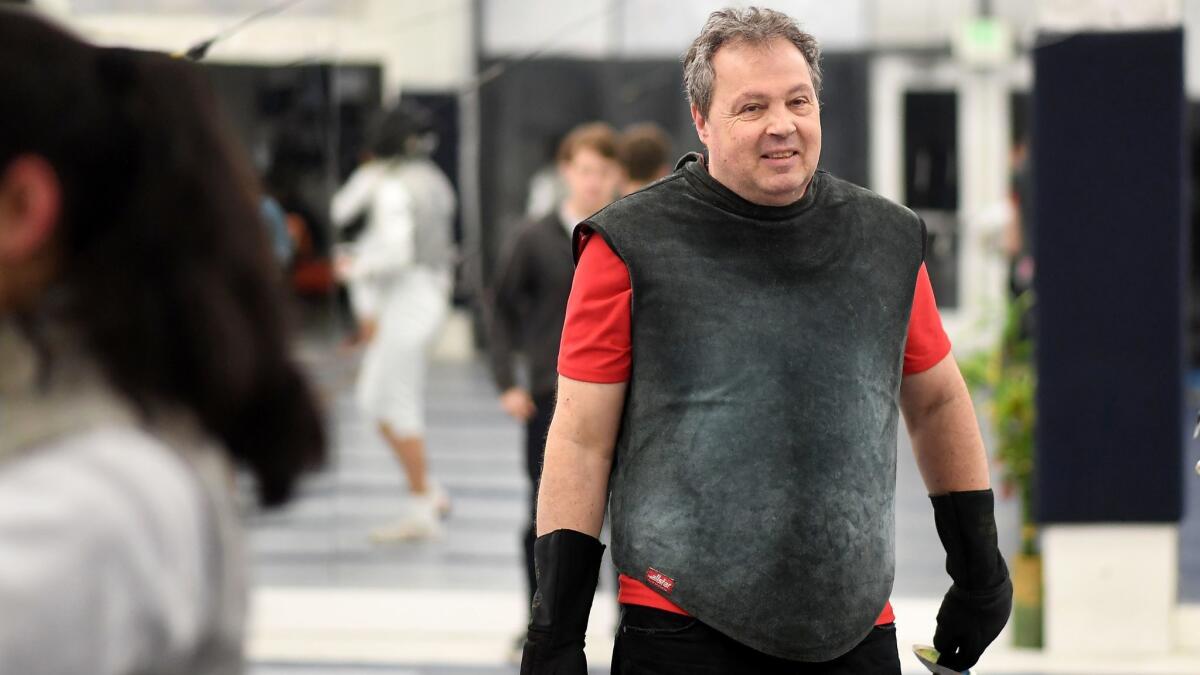
His family emigrated from Greece in the mid-1960s, settling in Michigan where, at 10, he happened upon a fencing class and fell for the sport. After competing through high school and college, finishing second at the 1976 NCAA championships, he focused on the Olympics.
The 1980 Moscow Games figured to be his best shot at a medal but, as he was returning from pre-Olympic training in Europe, a customs official told him the news: The U.S. had decided to boycott because of the Soviet invasion of Afghanistan.
“That was obviously a bitter disappointment,” Massialas said.
There would be other chances at the 1984 Los Angeles Games and the 1988 Seoul Games, but his best years had passed him by and he never reached the podium. Returning home to begin a career in advertising, Massialas planned to stay connected to the sport as a referee.
Then his wife, Vivian, spoke up.
You know fencing, she told him. You have to coach.
Massialas began with afternoon programs at schools around San Francisco, then established a club.
“I asked myself, ‘What is the pedagogy that will make this work?’” he recalled.
Having trained with coaches from around the world, he combined Hungarian saber footwork with Italian structure and French point control. The Germans’ work ethic appealed to him. Then came an American twist.
In other countries, fencers could develop over a period of many years, supported by state-run sports academies. In the U.S., with less financial backing, they often drifted away to jobs a few years after college.
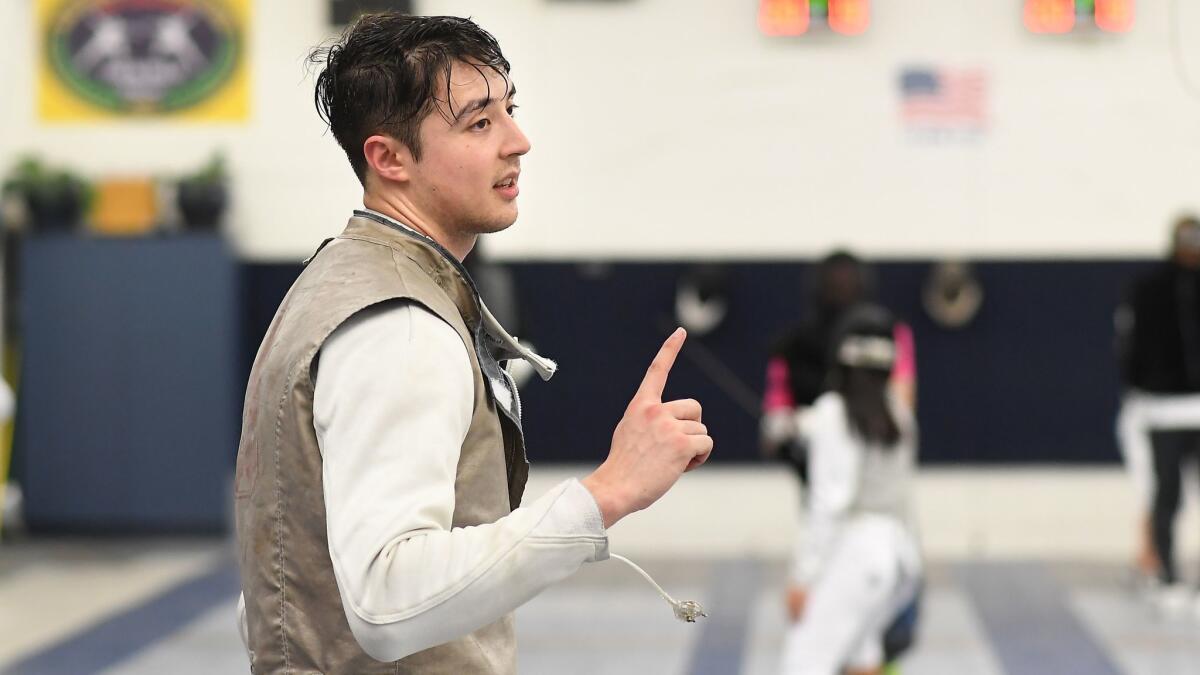
Massialas decided on a fast-track approach, pushing his young students to “fence up” in older age groups. He wanted them to try for the Olympics as teenagers and be ready for medal contention by their early 20s.
Alexander was still in preschool at the time, so the older Meinhardt served as a test case.
Massialas had him competing at a national level by age 10 — only a year after starting the sport — and he rose quickly through the junior ranks. In 2007, Meinhardt became the first men’s fencer to earn a spot on the cadet, junior and national men’s teams in the same season.
At 17, he made the U.S. team that traveled to the 2008 Beijing Olympics.
“It was a huge challenge,” Meinhardt said. “When you fence guys who are older, stronger, faster, it makes you find new ways to score that you wouldn’t have to find if you were facing kids your own age.”
::
The club had a policy against taking students younger than 7, the owner convinced that kids needed a modicum of strength and maturity before wielding a blade. This rule extended to his son, who had to sit and watch for a few years.
“I was disappointed,” Alexander said. “But I never complained.”
Massialas interrupted: “Yes, you did.”
Though the father did not force his children to fence, he kept a trophy case in the living room and his Olympic mementos inspired them.
“There was always a little sense in the back of your head that you’re chasing his ghost,” Alexander said. “Also, we were lucky to be born to one of the best coaches of all time.”
Alexander broke through at 17, winning individual gold at the 2011 Pan Am Games, then qualified for the 2012 London Olympics and finished a promising 13th.
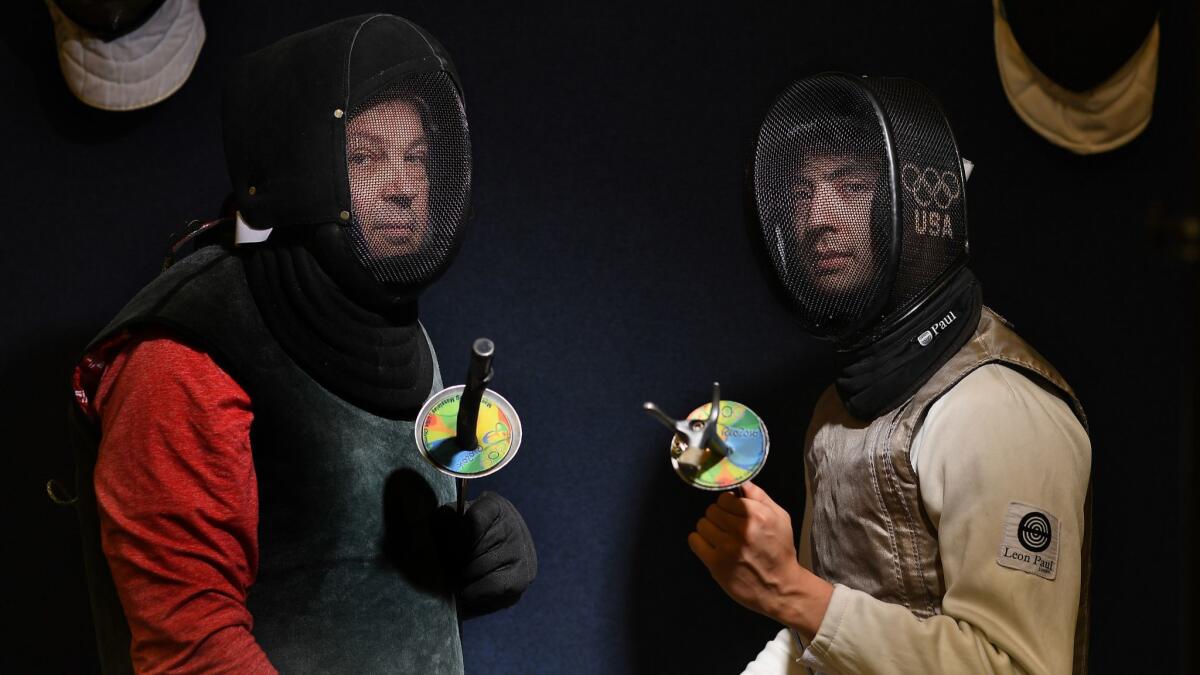
Three years younger, Sabrina talked her way into starting lessons at 6 — “She was more pestering,” her father said — and began making the women’s national team on a regular basis by 2014.
In contrast to the technique-based Eastern European model, Massialas emphasized competitiveness in practice with fewer drills, more bouting, Meinhardt said. Improvisation was encouraged, to a point.
“If you’re not doing what I tell you,” the coach would say, “you’d better hit.”
Working with Alexander and Sabrina required a little more nuance, if only because they all ended up around the same dinner table at night. The family adopted a mantra:
Dad at home, coach on the strip.
That line got blurred at the 2016 Summer Olympics.
Arriving in Rio de Janeiro as the top-ranked foilist, Alexander battled his way through the draw to face Garozzo in the gold medal match. The Italian surprised him with an unexpected strategy that had Alexander turning to the sideline between points, hands in the air. His father tried shouting instructions.
“It was so loud,” the elder Massialas said. “He couldn’t hear.”
By the time they made the necessary adjustments, after the first period, it was too late and Garozzo held on for a 15-11 victory.
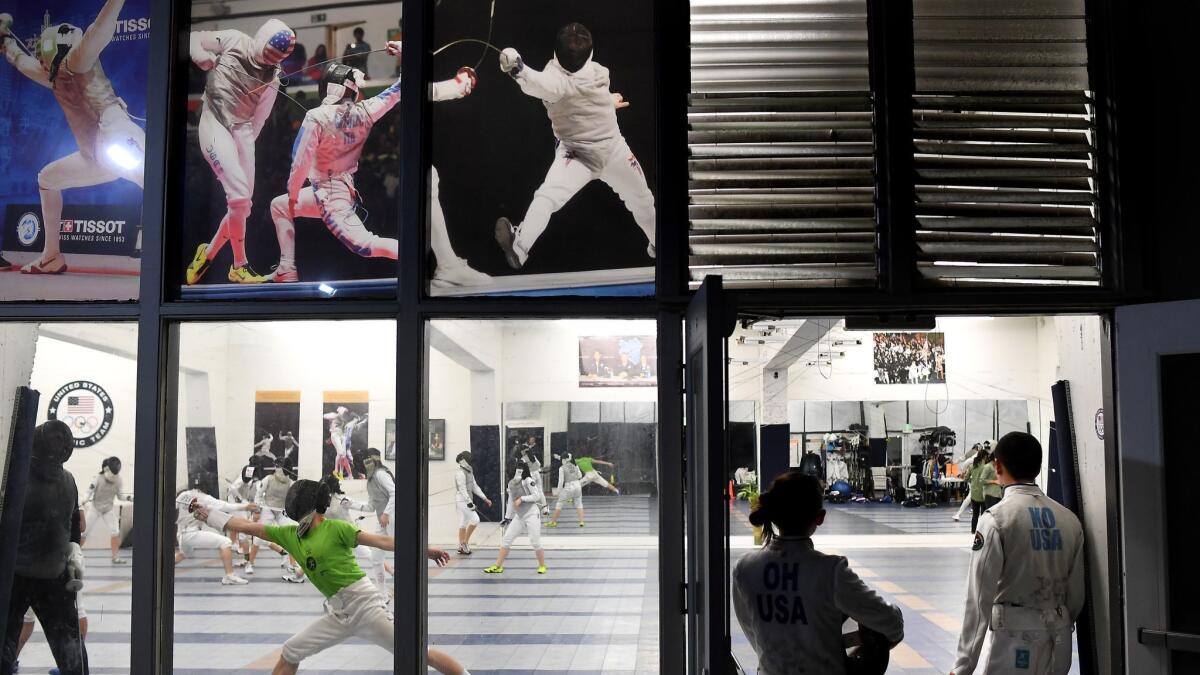
Alexander stood in tears, shaking his head. His father came up behind him and said, “It’s OK.”
“This is where I had to be the dad right away,” Massialas said. “Give him a long hug.”
::
American fencers began reaching the Olympic podium in increasing numbers starting in the early 2000s, with clubs such as the Peter Westbrook Foundation and Manhattan Fencing Center producing a new generation of stars that included Mariel Zagunis and Tim Morehouse in saber.
As an Olympic coach for Italy and then Russia, Stefano Cerioni watched this rise and noted Massialas’ part in it.
“For sure, his influence on the American foil team has been very positive,” Cerioni said through an interpreter. “He’s had very good results.”
The path to Tokyo in 2020 will be difficult for Sabrina, who has struggled through foot surgery and a hip injury since winning gold at the 2014 Youth Olympics. But Meinhardt appears poised to make his fourth Olympic team and Alexander should be there too, as a podium favorite.
“His technique is not usual but he just has this amazing feel for getting the touch,” Cerioni said. “Somehow he senses it.”
After graduating from Stanford, where he won two NCAA titles and earned a mechanical engineering degree, the 24-year-old has more time to train. The silver in Rio — along with a team bronze — has him wanting more.
“I’ve never been hungrier,” he said.
His father uses similar language.
So many years after Massialas stuck that plan on the wall, checking it every day, nothing has changed with his goal of bringing gold to the U.S. in a sport that is always fighting for attention.
“We still feel we have a good run at things,” he said. “We still feel there is more on the table to take care of.”
Follow @LAtimesWharton on Twitter
More to Read
Go beyond the scoreboard
Get the latest on L.A.'s teams in the daily Sports Report newsletter.
You may occasionally receive promotional content from the Los Angeles Times.











